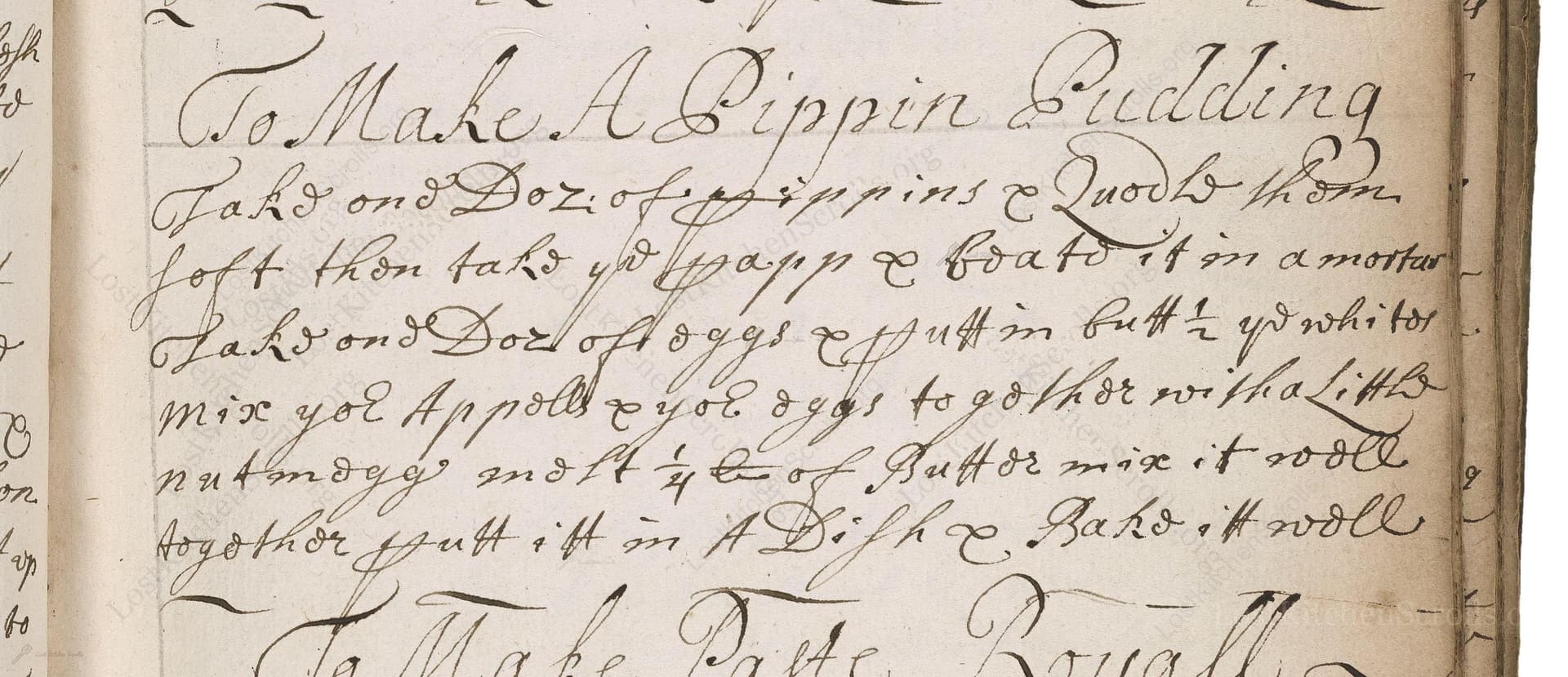To Make A Pippin Pudding
From the treasured pages of Cookbook of Ann Smith, Reading
Written by Ann Smith

To Make A Pippin Pudding
"Take one Doz: of pippins & Quodd them soft then take yoE papp & beatE itt in a mortar. Take one Doz: of Eggs & putt in but 1/2 yd whites mix yoE AppollE & yoE Eggs together with a little nutmEgg & and A little of Butter mix it well together. putt itt on A Dish & bake it well."
Note on the Original Text
The recipe is written in early modern English, where spelling was fluid and often phonetic—‘quodd’ refers to 'stew,’ ‘yoE’ seems to stand for 'your,’ and 'papp’ denotes the apple pulp. Punctuation and consistent grammar are scarce, and quantities and times were rarely measured precisely. The clarity and format reflect domestic manuscript tradition: a list of actions rather than detailed instructions, assuming the reader’s culinary literacy.

Title
Cookbook of Ann Smith, Reading (1698)
You can also click the book image above to peruse the original tome
Writer
Ann Smith
Era
1698
Publisher
Unknown
Background
Step into the sumptuous kitchens of 17th-century England with Ann Smith’s culinary treasury, where traditional recipes and time-honored techniques invite you to savor the flavors of history. Each page promises a feast of inspiration and a glimpse into the artful dining of a bygone era.
Kindly made available by
Folger Shakespeare Library
This recipe for 'Pippin Pudding' comes from the late 17th century, specifically dated to the year 1698. It is attributed to Ann Smith, a woman likely responsible for a household or estate kitchen. Pippin apples were a highly esteemed variety in early modern England, beloved for their bright flavor and firm texture. Puddings of this type, rich with eggs and sometimes bread or flour, were central to both country and gentry fare, served hot or cold as a dessert or substantial side course. The recipe reflects the period’s fondness for sweetened apple dishes, often perfumed with spice and enriched with butter.

In the late 1600s, Ann Smith would have used a mortar and pestle to pound the cooked apples to a fine pulp and possibly to also blend the eggs in. Apples would have been stewed in heavy-bottomed copper or iron pans over an open hearth. The mixing was likely done by hand, and the pudding baked in a hearth oven or a deep dish set within the coals, with embers set atop a lid to ensure even baking.
Prep Time
40 mins
Cook Time
50 mins
Servings
10
We've done our best to adapt this historical recipe for modern kitchens, but some details may still need refinement. We warmly welcome feedback from fellow cooks and culinary historians — your insights support the entire community!
Ingredients
- 12 medium pippin apples (about 2.5–3.3 lbs), or substitute with Bramley or Granny Smith apples
- 12 large eggs (use only 6 egg whites, all 12 yolks)
- 1/2 teaspoon freshly grated nutmeg
- 3 1/2 tablespoons unsalted butter, plus extra for greasing
- A splash of water (for stewing apples)
Instructions
- Begin by taking about 12 medium-sized pippin apples (roughly 2.5–3.3 lbs), peeling and coring them.
- Stew the apples gently in a saucepan with a splash of water until they are tender, then mash them into a pulp—this can be done with a food processor or by hand with a potato masher.
- In a mixing bowl, combine the apple pulp with 12 large eggs, using only half the egg whites (i.e., 12 yolks and 6 whites).
- Add about 1/2 teaspoon freshly grated nutmeg and 3 1/2 tablespoons of softened unsalted butter.
- Mix everything thoroughly until fully incorporated and smooth.
- Pour the mixture into a buttered baking dish and bake in a preheated oven at 350°F for around 45–55 minutes, or until set and lightly golden.
- Serve warm or at room temperature.
Estimated Calories
170 per serving
Cooking Estimates
You'll spend some time peeling and stewing the apples, combining the ingredients, and baking the mix. The total time for prepping and baking is about 1 hour and 30 minutes. The recipe makes enough for about 10 servings, and each serving has around 170 calories.
As noted above, we have made our best effort to translate and adapt this historical recipe for modern kitchens, taking into account ingredients nowadays, cooking techniques, measurements, and so on. However, historical recipes often contain assumptions that require interpretation.
We'd love for anyone to help improve these adaptations. Community contributions are highly welcome. If you have suggestions, corrections, or cooking tips based on your experience with this recipe, please share them below.
Join the Discussion
Rate This Recipe

Den Bockfisch In Einer Fleisch Suppen Zu Kochen
This recipe hails from a German manuscript cookbook compiled in 1696, a time whe...

Die Grieß Nudlen Zumachen
This recipe comes from a rather mysterious manuscript cookbook, penned anonymous...

Ein Boudain
This recipe comes from an anonymous German-language manuscript cookbook from 169...

Ein Gesaltzen Citroni
This recipe, dating from 1696, comes from an extensive anonymous German cookbook...
Browse our complete collection of time-honored recipes



